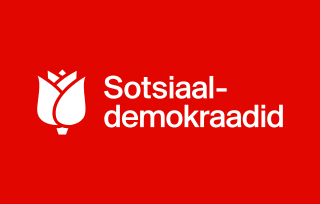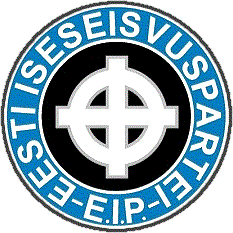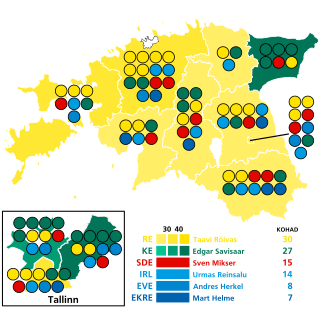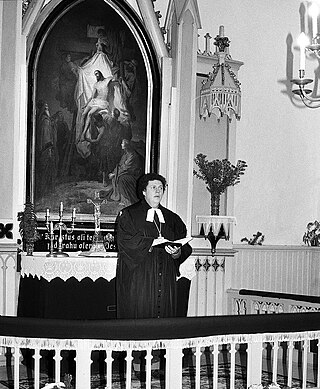Related Research Articles

The People's Union of Estonia was a political party in Estonia. Its last leader was Margo Miljand.
Res Publica Party was a political party in Estonia that self-identified as conservative. Established as a party on 8 December 2001, the political organisation Res Publica was founded already as early as 1989 and existed as a community of young conservatives, mostly associated with the Pro Patria Union party during the 1990s. Res Publica was a member of the EPP on the European level. It merged with Pro Patria Union in 2006 to form the Pro Patria and Res Publica Union.

The Social Democratic Party is a centre-left political party in Estonia. It is currently led by Lauri Läänemets. The party was formerly known as the Moderate People's Party. The SDE has been a member of the Party of European Socialists since 16 May 2003 and was a member of the Socialist International from November 1990 to 2017. It is orientated towards the principles of social-democracy, and it supports Estonia's membership in the European Union. From April 2023, the party has been a junior coalition partner in the third Kallas government.
The Pro Patria Union was a national-conservative political party in Estonia. The party was founded on 2 December 1995 from a merger of the Estonian National Independence Party and the Pro Patria National Coalition.

Parliamentary elections were held in Estonia on 2 March 2003. The newly elected 101 members of the 10th Riigikogu assembled at Toompea Castle in Tallinn within ten days of the election. Two opposing parties won the most seats, with both the Centre Party and Res Publica Party winning 28 seats in the Riigikogu. Res Publica was able to gain enough support in negotiations after the elections to form a coalition government.

The Estonian Independence Party was a far-right nationalist political party in Estonia. The small party, founded in 1999, never had any significant success in the elections, and it was dissolved in 2022. One of the principal aims of the party was the withdrawal of Estonia from the European Union.

Parliamentary elections were held in Estonia on 4 March 2007. The newly elected 101 members of the 11th Riigikogu assembled at Toompea Castle in Tallinn within ten days of the election. It was the world's first nationwide vote where part of the voting was carried out in the form of remote electronic voting via the internet.
People's Party of Republicans and Conservatives was an Estonian political party, which existed under this banner from 1994 to 1998.

Isamaa is a Christian-democratic and national-conservative political party in Estonia.
The Estonian Greens is a green political party in Estonia. Founded in 2006, the party held six seats in the Riigikogu from 2007 to 2011. Its objective is to ensure that Estonia's development is environmentally friendly, sustainable, politically stable and economically efficient.
Libertas was a pan-European political party founded by Declan Ganley that took part in the 2009 European Parliament election in several member states of the European Union. It won one seat in France.
Libertas UK may refer to three political parties in the United Kingdom: two are regional affiliates of Declan Ganley's Libertas Party Limited, one of which, Pro-Democracy: Libertas.eu, contended the 2009 European Parliament elections under a common banner with Libertas Party Limited. The third was formed by an associate of the United Kingdom Independence Party (UKIP).
Libertas Sweden is a political party in Sweden. It intended to contend the 2009 European Parliament elections under a common banner with Declan Ganley's Libertas.eu.
Libertas Ireland was a minor, Eurosceptic political party in Ireland. It contended the 2009 European Parliament elections in Ireland under a common banner with Declan Ganley's Libertas.eu. It shared a headquarters with Libertas.eu but was a national party in its own right for the purposes of Irish electoral law.
The Republican Party was a political party in Estonia, founded in 1999. The chairman of the party was Kristjan-Olari Leping, a lecturer of economic theory at the pärnu college of the University of Tartu. The party was of neo-conservative, new rightist and national conservative orientation; it identifies itself as close to Pro Patria Union and Reform Party of Estonia, but more radical. The organization was also strongly eurosceptic.

Parliamentary elections were held in Estonia on 1 March 2015. Advance voting was held between 19 and 25 February with a turnout of 33 percent. The Reform Party remained the largest in the Riigikogu, winning 30 of the 101 seats. Its leader, Taavi Rõivas, remained Prime Minister. The newly elected 101 members of the 13th Riigikogu assembled at Toompea Castle in Tallinn within ten days of the election. Two political newcomers, the Free Party and the Conservative People's Party (EKRE) crossed the threshold to enter the Riigikogu.

Illar Hallaste was an Estonian cleric, politician, lawyer, and businessman, most notable for being a voter for the Estonian restoration of Independence.

Party of People's Unity was a civic nationalist anti-immigration Estonian political party active in 2014–2019.
References
- 1 2 3 4 "Libertas Eesti Erakond osaleb europarlamendi valimistel" from postimees.ee, English translation here
- 1 2 3 4 5 6 7 8 9 10 "Libertas Eesti Erakond (LEE) Archived 2009-04-12 at the Wayback Machine ", from Eesti Erakondade Ajalugu Archived 2009-03-27 at the Wayback Machine , English translation here
- ↑ Political party: LIBERTAS EESTI Erakond Archived 2012-02-22 at the Wayback Machine , from the Estonian Centre of Registers and Information Systems/Registrite ja Infosüsteemide Keskus
- ↑ "Libertas Eesti Erakond kinnitas Europarlamendi valimisnimekirja Archived May 3, 2009, at the Wayback Machine ", undated page, http://www.libertas.eu
- ↑ "Results:Estonia". Archived from the original on 2016-01-27.